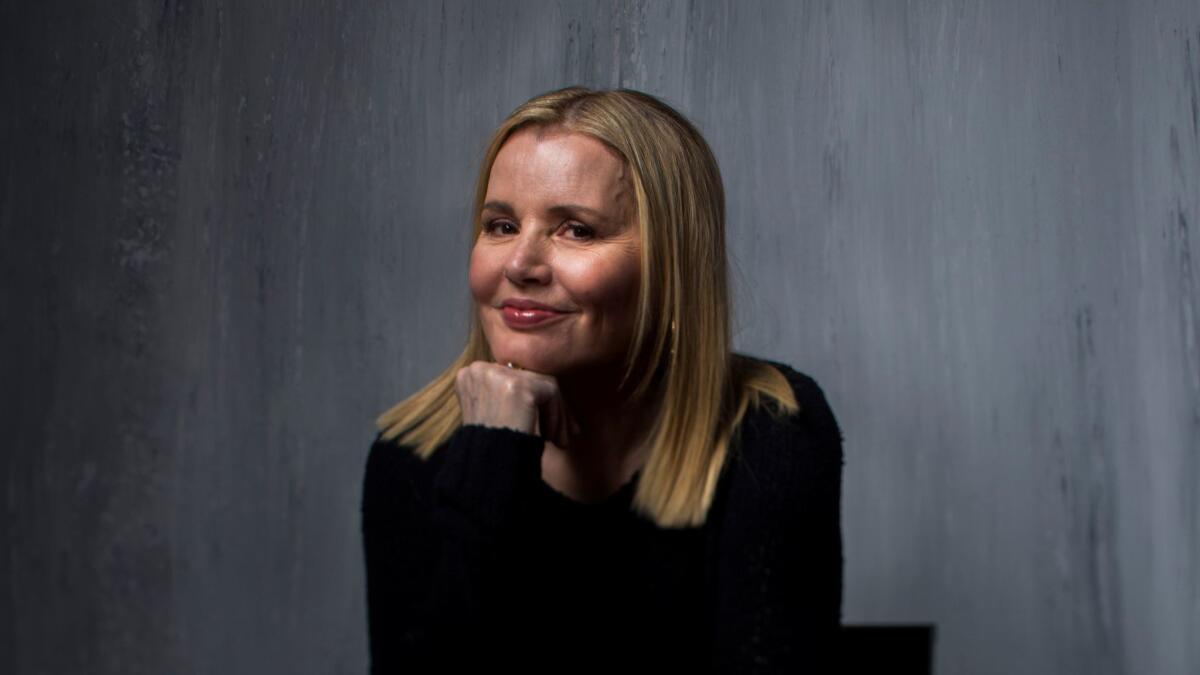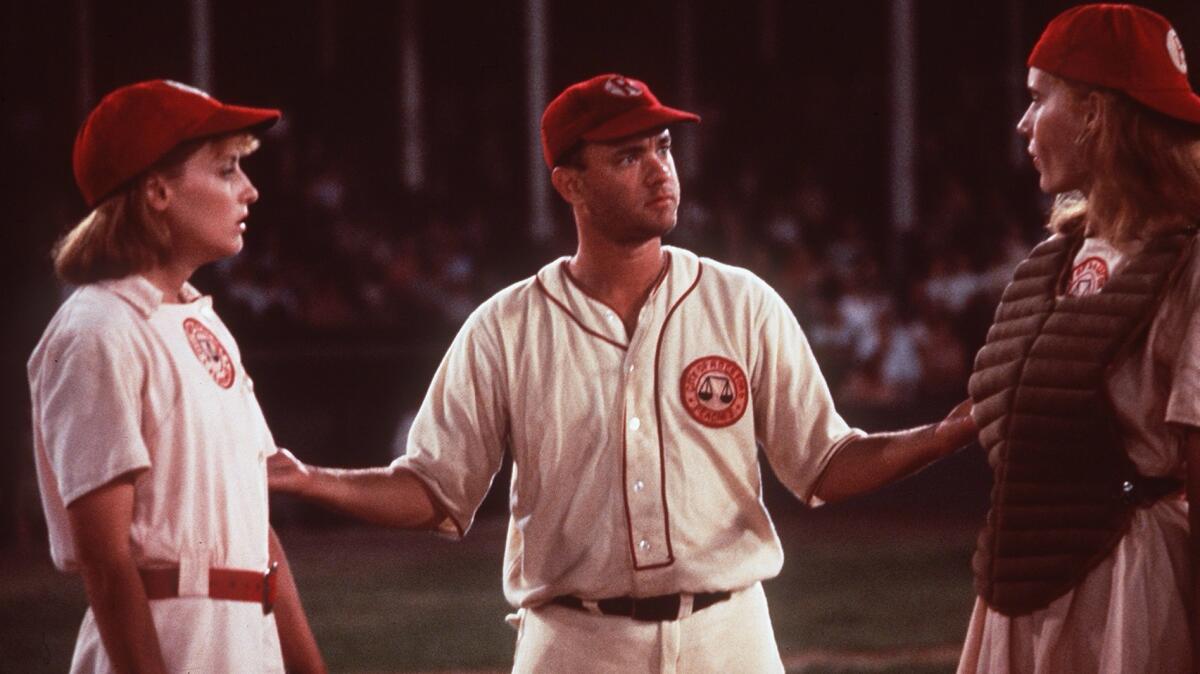Q&A: On ‘A League of Their Own’s’ 25th anniversary, Geena Davis still isn’t afraid to say ‘feminist’

- Share via
It’s been 25 years since Geena Davis starred in “A League of Their Own,” a film that broke ground not only for its strong, mostly female cast but because it was a major film directed by a woman, Penny Marshall.
Released July 1, 1992, the film was based on the true story of an all-women baseball league started during World War II and went on to become a beloved, and still all too rare, female-centered sports film. Coming out just a year after she and Susan Sarandon made movie history by driving their 1966 Ford Thunderbird into the Grand Canyon, “League” helped seal Davis’ place in Hollywood as a feminist voice.
Davis, who won an Oscar in 1989 for “The Accidental Tourist,” was nominated for a Golden Globe for her role in “League,” which also starred Tom Hanks, Lori Petty, Rosie O’Donnell, Jon Lovitz and Madonna. After winning a Golden Globe in 2006 for the TV series “Commander in Chief” — playing a female U.S. president — she has continued to move between television and movies. In January, she was at Sundance with the film “Marjorie Prime” and has in the last few years appeared on TV’s “The Exorcist” and “Grey’s Anatomy.”
Beyond her acting roles, however, she has become a real force off-camera. She founded the Geena Davis Institute on Gender in Media, which conducts research to create statistics around gender and diversity representation in entertainment. And she co-founded the Bentonville Film Festival in Bentonville, Ark., dedicated to supporting women and diversity in the entertainment industry. At this year’s festival, she participated in a celebratory baseball game to mark the anniversary of “A League of Their Own,” which was recently released in a new Blu-ray edition.
In this interview, Davis talks about “A League of Their Own” and how she’s still having many of the same conversations about women in Hollywood that she did when the film was first released.
If “A League of Their Own” were coming out today, the fact that it’s a little-known story of women’s history with a mostly female cast and a female director would be much talked about. How did people respond to the movie at the time?
Reporters came to the set to interview us, and I noticed immediately that they all asked at some point, “Do you think this is a feminist movie?” Sort of conspiratorial, like, “I’m not really saying this out loud” sort of a thing and like, “Wouldn’t it be weird if you actually said yes?”
And I would say yes. And they would say, “What, you do? Can I say that you said that?” And I was like, yes, you can. I mean, what’s your definition of feminist? Feminist means believing in equal rights and opportunities, and this is about women playing baseball. So it’s about women can play too.
But they were horrified; it was like I had said something horrifying and they generously wanted to be sure I wanted to allow them to print that I had said that.
Feminist means believing in equal rights and opportunities, and this is about women playing baseball. So it’s about women can play too.
— Geena Davis
Are things much better now? No, although I don’t think they’d whisper the question. But as far as the perception of it when it came out, I noticed there was so much prognosticating that this would change everything. Now that there’s been a tremendous hit, a very successful movie starring women, there were going to be so many female sports movies. And I particularly noticed that because when I had done “Thelma and Louise,” which came out a year earlier, it was the same thing. The press was saying this changes everything. There are going to be so many female road pictures, female buddy pictures, just more movies starring women because it struck such a nerve. And neither prediction proved to be true whatsoever.
Was the movie pivotal for you personally?
It was huge. It was very pivotal to my life in multiple ways. One was experiencing the reaction of young girls to the movie and so many girls and young women saying, “I took up sports because of that movie.” I still have the same number of girls and women telling me they play sports because of that movie now as I did then. It’s like a rite of passage to see this movie. It’s got remarkable longevity.
Also, just on a personal level, I had never really played any sports, and I definitely couldn’t play baseball when I got cast. And so I trained really hard, and it was the first time that I was told that I had untapped athletic ability, which was an incredible compliment in my book, and so I felt like I really did, and it changed everything about my self-esteem and my self-confidence. I’d always been a little self-conscious about my height. It was hard when I was in high school and everything, and I definitely felt I should be taking up less space in the world.
Learning to play a sport really changed my life. I became a trustee of the Women’s Sports Foundation for 10 years, I had a website encouraging girls to know their rights through Title IX, and then eventually I took up archery because of that, and at 41 became a semifinalist at the Olympic trials three years later. So it had a very big and lasting impact on my life
Does the conversation around women in media feel different now? Does having actual numbers through the work of the institute help move the conversation?
That’s an excellent thought, because there is definitely far more talk about it now than back then. I even felt some compunction to not complain about not having enough parts, saying, “Oh, I’m just taking a vacation or a break,” or “I’m just really fussy.” Which I am, but don’t ever admit that there aren’t enough parts or you might seem unpopular. But now, as we see, so many of my peers and myself are talking about it and bringing it up, saying, “Hey, I’m not getting paid equally,” “Hey, there’s not enough parts” [rather] than, “I was turned down because I was too old at 36.” And definitely that has changed, though whether that will create more change we have yet to see.
So numbers, two things: One is, children’s entertainment media, I figured out a way to address it, to attack the problem that is tremendously effective, which is getting the numbers. It’s made all the difference. People didn’t know, the people making kid’s entertainment, they had no idea they were leaving out that many female characters in the world that was being created. So the numbers have made all the difference, and we’ve seen lots of evidence that merely learning the numbers is working because people makings kids’ entertainment actually care about kids and want to do right by kids.
However, for behind the camera, the numbers and the data have done absolutely nothing. The percentage of female directors has been known for decades; everybody knows.
SIGN UP for the free Indie Focus movies newsletter »
There is nobody who would say, “I’m shocked to find out how few female directors there are.” So that has no impact, knowing the numbers, and to generalize completely I would say that on-screen lack of women is unconscious bias, and from the evidence, one would have to assume that behind the camera is conscious bias. So numbers are not going to change that and what I think will, is people doing like Ryan Murphy is doing and saying, “I’m just going to [hire] half [women] and making it happen. I just am, I’m not going to complain that there’s not enough, I’m going to find them and hire them.”

In “A League of Their Own,” did you really catch that pop-up fly ball behind your back?
I did. I figured out if you let the ball come right at your head, line yourself up so the ball is coming straight at your head and then duck your head forward as it comes, it will go right down your back. It turned out to be really easy, actually, once I figured out the physics of it.
Special series: The past, present and uncertain future of the multiplex »
Follow on Twitter: @IndieFocus
ALSO
Sofia Coppola makes ‘The Beguiled’ A Southern Gothic tale all her own
On the generous curiosity of Jonathan Demme and how he allowed audiences along for the ride
Only good movies
Get the Indie Focus newsletter, Mark Olsen's weekly guide to the world of cinema.
You may occasionally receive promotional content from the Los Angeles Times.








